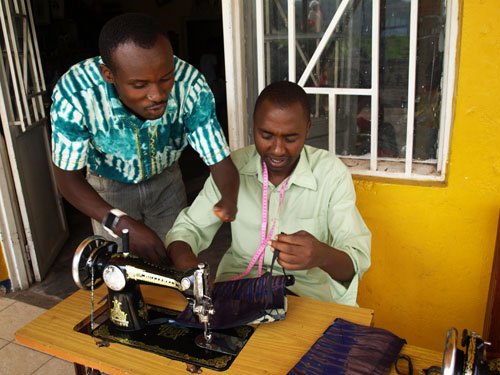
I never would have guessed that he used to be a street boy. Or a beggar for that matter. With his big smile and humble & grateful demeanor, his spirit shines bright around COHWI, a cooperative for disabled artisans. I never intended to get his life story when I asked about the co-op. It just sort of happened. But everyone has a story… something that makes them stronger than they were the day before, that gives them motivation to do what they do.
I found Jean and COHWI through Ubumwe Center, an NGO that, among many activities, provides skills training to disabled people (plus, Ubumwe is sponsored by Jack Hanna… an automatic coolness factor!). In the past, the handicapped have been marginalized in Rwanda. In addition to those born with disabilities, Rwanda has a high rate of physically and mentally disabled (many suffer from PTSD) as a result of the genocide.
COHWI is making some beautiful little catchall bags for Amsha. As I sat down with Jean to take notes on the co-op history, I hit on one question that received the “Well that’s a long story,” response. I actually wasn’t sure that he would continue, as I didn’t want to corner him into discussing a sensitive topic. But after a bit of a pause he began to answer my question about how Rwandese mindsets have changed about disabilities since he was a young child. Though it is paraphrased, and I’m sure I have omitted some important details that were lost in translation, this is Jean’s story:
“When I was born, I was not wanted. My father claimed that I wasn’t his child. Because my mother would not leave my father, I was sent to live with a grandmother. When I was four or five, she could no longer care for me, so I went to live at an orphanage. I went to school. When I was nine or ten, after Class 5, my grandmother made me come home. She said I wasn’t going to school anymore but that I needed to look after the animals- the goats, the sheep. I didn’t like the idea. I moved to town by myself (he was around 14 by then). I became a street boy. Sometimes I cut hair or sold things, but I was like a beggar. When I was 17, I went back to my grandmother’s. Zacharie and Frederick (co-founders of Ubumwe) found me on the street in Gisenyi one day (he was around 20).
I started going to Ubumwe. I learned banana leaf weaving and paper beading. I had always loved art and drawing. I went for two years. I realized I could make money for myself. At the end, I was only going two days a week so I could go to hotels and try to sell my necklaces. I was invited by [a government organization that works with disabled people] to Kigali to show at an exposition. I placed 2nd for the crafts I made. Rwanda sent me to an expo in Nairobi, where I placed 7th for Rwanda. I realized how I capable I am. I showed at another exposition in Dar Es Salaam (he pauses to grab a basket of seashells he has in his office that he collected on that trip). I got many ideas from these expos.
Other people may see nothing, but I saw many ideas. I made a short film to show people that I can do something. My neighbors thought of me like an animal, now they saw what I could do. The government invited people who need help to come to a meeting, but I spoke at it saying I didn’t need help. I can make money. I built my own house. I can hire people to work for me. And I can find a beautiful woman to be my wife (at that he smiles).
I got an idea to start a cooperative and told my idea to Zacharie. He liked it and asked me to take 16 people from Ubumwe. He provided us with equipment and assistance to get started. We still have a long road ahead of us. But now we pay our own rent. We train others in the community our skills. We are more capable than many people who are not disabled. We have regular people who come to us to learn our skills.
I help my mother now more than my siblings do. If she wants a shirt or needs food, I buy them for her. She tells everyone about her son. But sometimes I am still sad. My father died before he got to see what I can do. He never knew what I was capable of. And that is the end of my story.”
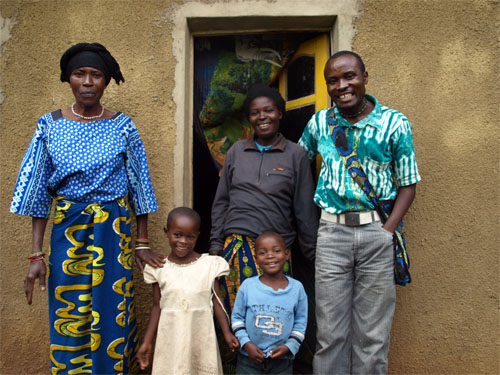
It is amazing how something so minor as a deformed hand could have, at one time, put him on the outs of society and shunned. And of course his story glossed over the genocide, making no mention at what must have been a traumatic life experience. But due to places like Ubumwe Center and COHWI, Jean says now people think nothing of it. If a woman gave birth to a child with a disability, the child is much more likely to be accepted now. Jean is truly someone who is changing the world, and making beautiful things along the way! My week spent with him and COHWI are some of the most memorable days I have from my five months in East Africa.
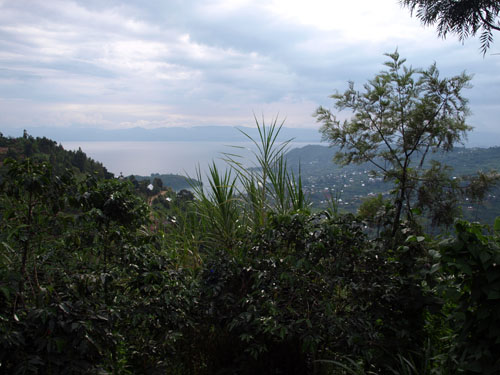
We took a harrowing motorbike ride up the side of a mountain to go visit his home and his family that provided sweeping views of Lake Kivu and the Congo. The employees of COHWI clearly have a great respect for Jean and always called him “President” rather than by name. I can’t wait to see this co-op grow and flourish. The artisans are eager to learn and eager to thrive in their new profession. Definitely an inspiration.
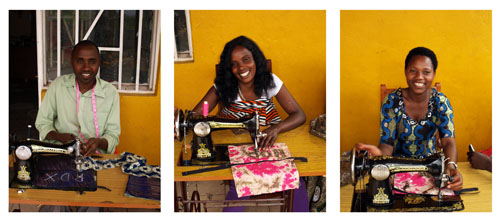
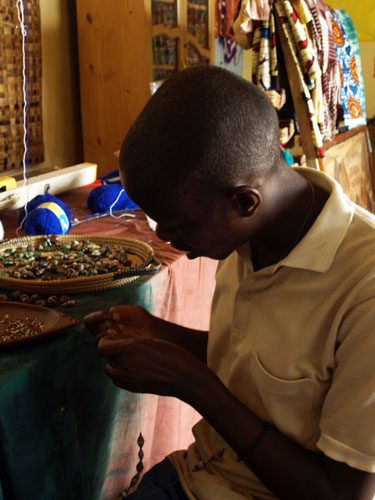
That’s an amazing story. There are so many inspiring people to be found in the midst of hardship. You’re so lucky to have been able to meet him and share in his happiness.
You r doing a Great job!!! Keep up the good work
Thanks for sharing Jean’s story! I’m sure you have so many stories to tell of the people you met and got to know. I’m looking forward to hearing them all.
Thanks for sharing this story Laura.x